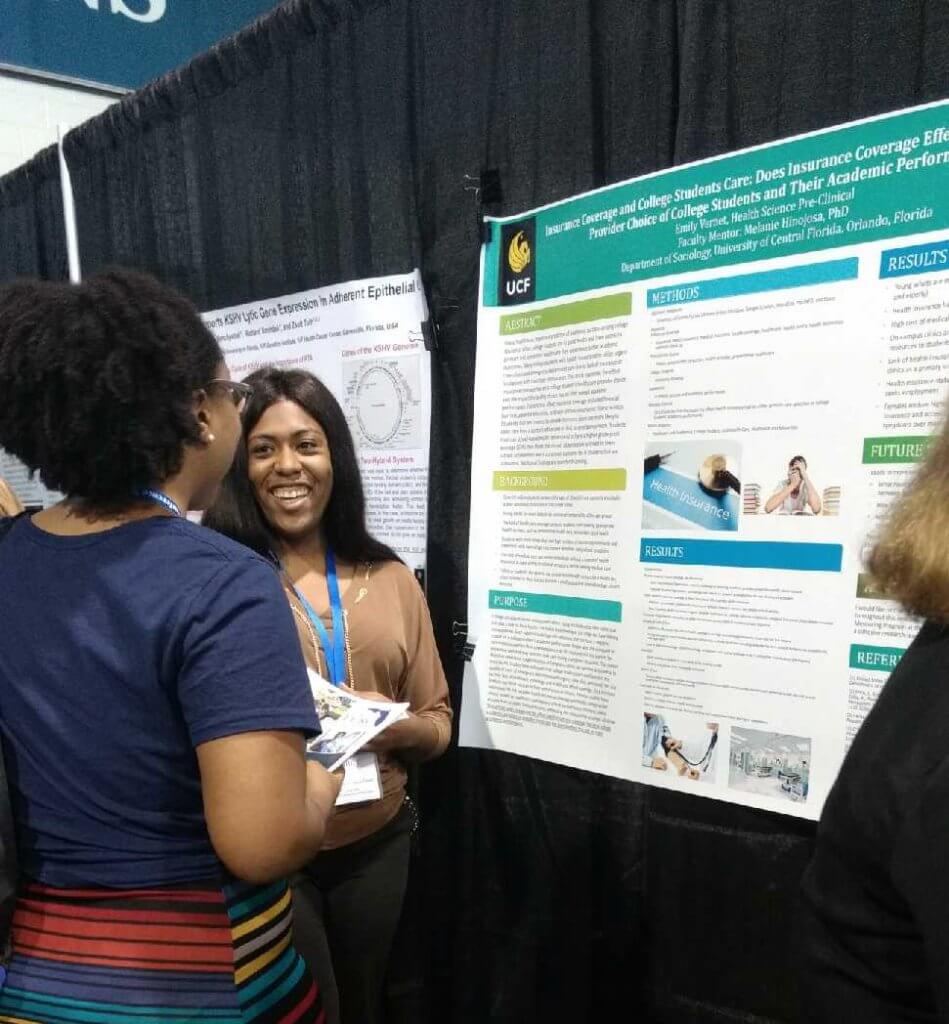I have known since my sophomore year of high school that I wanted to get into social science research in college because that’s where my academic interests lied. I chose a road less traveled by pre-medical students at UCF: opting out of majoring in Biomedical Science, Health Science, Biology, or Chemistry and choosing to major in Psychology instead. I thought that in order to do research in something I had to major in it. I soon had to switch my major to Health Science Pre-Clinical to better suit my pre-medical timeline. One thing that worried me with this transition was not being able to pursue a research opportunity in the social sciences anymore. I soon learned otherwise.
I started my research journey in the Summer Research Academy (SRA). SRA really help me understand just how diverse research can be. I learned about the different ways I could get involved in research in any discipline I choose. The peer mentors at SRA talked about their own research experiences, and it surprised me to hear that many of their research projects were done outside their major. I soon learned that the key to meaningful research is to find something that genuinely interests you despite the discipline it may fall under.
I currently conduct medical sociology research under the mentorship of Dr. Melanie Hinojosa. Medical sociology helped me find a happy medium between social science and medicine. My main project is an independent research study focusing on understanding the relationship between insurance coverage, primary care provider choice, and academic success among college students. Working on this project with Dr. Hinojosa for the past year has given me an escape from the biological science classes required by my major. I have a way to use my social science strengths by conducting research with human subjects.
It’s a lot more motivating to me to work on a project that I am interested in even though it doesn’t fully relate to what I learn in my hard-science classes. I have been able to teach myself through annotating scientific journal articles on topics related to human health and its societal effects. I’ve been able to explore and understand the challenges of ethics when working with human subjects. These are topics that have not been discussed in the lectures or textbooks of my classes, but will be useful as a medical professional in the future.
My confidence with scientific writing has been boosted by working on a literature review, submitting abstracts to present at research conferences, and creating a survey for my project. I am currently working on writing an extensive proposal for the UCF Institutional Review Board, an ethics committee whose mission is to protect the rights of human subjects participating in research studies and experiences. Most of my writing pieces receive constructive criticism and go through several drafts before they are ready for submission.
It was often tough thinking I wrote the perfect paper only for it to come back with revisions, but I am thankful for my mentor’s commitment to help me master my scientific writing skills. I have found that these skills are transferable to the classes in my major, too. It was surprising to see that even though most of my classes related to biology and chemistry. I was able to use something I learned in my social science research experience to do well when it came to writing lab reports for my chemistry classes.
If there’s one thing that I’ve learned throughout my research experience, it is that there is not a “one size fits all” approach to research.
Pursuing research outside of your major is a great way to explore your true interests and become well-rounded. Like many, I started out thinking that research meant you had to wear a white lab coat with goggles and work in a lab with chemicals and I learned very quickly that this is not the case. Research is simply contributing new knowledge in an area of study; therefore, research can be done in any major.
My advice to those that are interested in doing research outside of their major is to go for it! It’s a rewarding experience that’ll equip you will technical skills that you’ll not only use to contribute knowledge to your research field but will also use to make an impact to the world.
